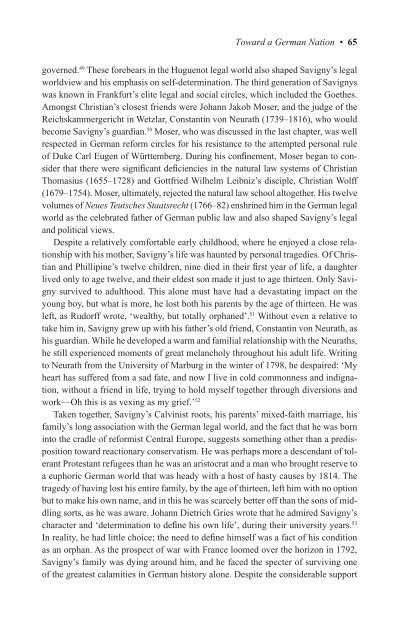Making of a German Constitution : a Slow Revolution
Making of a German Constitution : a Slow Revolution
Making of a German Constitution : a Slow Revolution
Create successful ePaper yourself
Turn your PDF publications into a flip-book with our unique Google optimized e-Paper software.
Toward a <strong>German</strong> Nation • 65governed. 49 These forebears in the Huguenot legal world also shaped Savigny’s legalworldview and his emphasis on self-determination. The third generation <strong>of</strong> Savignyswas known in Frankfurt’s elite legal and social circles, which included the Goethes.Amongst Christian’s closest friends were Johann Jakob Moser, and the judge <strong>of</strong> theReichskammergericht in Wetzlar, Constantin von Neurath (1739–1816), who wouldbecome Savigny’s guardian. 50 Moser, who was discussed in the last chapter, was wellrespected in <strong>German</strong> reform circles for his resistance to the attempted personal rule<strong>of</strong> Duke Carl Eugen <strong>of</strong> Württemberg. During his confinement, Moser began to considerthat there were significant deficiencies in the natural law systems <strong>of</strong> ChristianThomasius (1655–1728) and Gottfried Wilhelm Leibniz’s disciple, Christian Wolff(1679–1754). Moser, ultimately, rejected the natural law school altogether. His twelvevolumes <strong>of</strong> Neues Teutsches Staatsrecht (1766–82) enshrined him in the <strong>German</strong> legalworld as the celebrated father <strong>of</strong> <strong>German</strong> public law and also shaped Savigny’s legaland political views.Despite a relatively comfortable early childhood, where he enjoyed a close relationshipwith his mother, Savigny’s life was haunted by personal tragedies. Of Christianand Phillipine’s twelve children, nine died in their first year <strong>of</strong> life, a daughterlived only to age twelve, and their eldest son made it just to age thirteen. Only Savignysurvived to adulthood. This alone must have had a devastating impact on theyoung boy, but what is more, he lost both his parents by the age <strong>of</strong> thirteen. He wasleft, as Rudorff wrote, ‘wealthy, but totally orphaned’. 51 Without even a relative totake him in, Savigny grew up with his father’s old friend, Constantin von Neurath, ashis guardian. While he developed a warm and familial relationship with the Neuraths,he still experienced moments <strong>of</strong> great melancholy throughout his adult life. Writingto Neurath from the University <strong>of</strong> Marburg in the winter <strong>of</strong> 1798, he despaired: ‘Myheart has suffered from a sad fate, and now I live in cold commonness and indignation,without a friend in life, trying to hold myself together through diversions andwork—Oh this is as vexing as my grief.’ 52Taken together, Savigny’s Calvinist roots, his parents’ mixed-faith marriage, hisfamily’s long association with the <strong>German</strong> legal world, and the fact that he was borninto the cradle <strong>of</strong> reformist Central Europe, suggests something other than a predispositiontoward reactionary conservatism. He was perhaps more a descendant <strong>of</strong> tolerantProtestant refugees than he was an aristocrat and a man who brought reserve toa euphoric <strong>German</strong> world that was heady with a host <strong>of</strong> hasty causes by 1814. Thetragedy <strong>of</strong> having lost his entire family, by the age <strong>of</strong> thirteen, left him with no optionbut to make his own name, and in this he was scarcely better <strong>of</strong>f than the sons <strong>of</strong> middlingsorts, as he was aware. Johann Dietrich Gries wrote that he admired Savigny’scharacter and ‘determination to define his own life’, during their university years. 53In reality, he had little choice; the need to define himself was a fact <strong>of</strong> his conditionas an orphan. As the prospect <strong>of</strong> war with France loomed over the horizon in 1792,Savigny’s family was dying around him, and he faced the specter <strong>of</strong> surviving one<strong>of</strong> the greatest calamities in <strong>German</strong> history alone. Despite the considerable support




